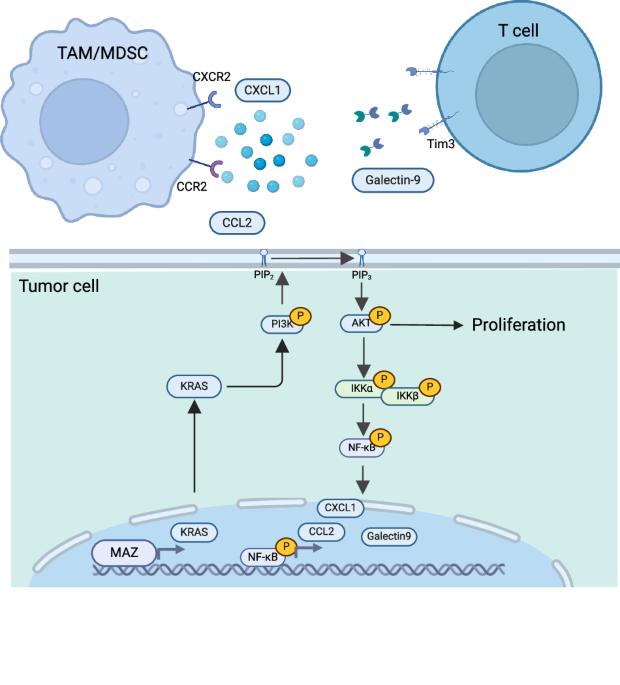MAZ 可促进肺腺癌的肿瘤增殖和免疫逃避。
IF 6.9
1区 医学
Q1 BIOCHEMISTRY & MOLECULAR BIOLOGY
引用次数: 0
摘要
肺腺癌(LUAD)是肺癌中最主要的组织学亚型,也是最致命的恶性肿瘤之一。治疗肺腺癌需要找到新的治疗靶点。在这里,我们发现MYC相关锌指蛋白(MAZ)在LUAD组织中上调。MAZ的表达水平与患者的存活率成反比。沉默MAZ可减少肿瘤增殖,降低促致癌趋化因子和免疫检查点分子Galectin-9(Gal-9)的表达。促致癌趋化因子和Gal-9分别通过招募髓系细胞和抑制T细胞活化来诱导免疫抑制。从机理上讲,MAZ 可转录调节 KRAS 的表达,并激活其下游的 AKT-NF-κB 信号通路,这对肿瘤进展和免疫逃避至关重要。此外,体内动物模型和生物信息学分析表明,抑制MAZ可提高免疫检查点阻断疗法(ICB)治疗LUAD的疗效。总之,我们的研究结果表明,在LUAD中,MAZ通过KRAS/AKT/NF-κB信号在调节细胞增殖和免疫逃避方面发挥着重要作用。我们的研究结果为LUAD的治疗提供了一个候选分子靶点,对提高ICB疗法的疗效具有重要意义。本文章由计算机程序翻译,如有差异,请以英文原文为准。

MAZ promotes tumor proliferation and immune evasion in lung adenocarcinoma
Lung adenocarcinoma (LUAD) is the most dominant histological subtype of lung cancer and one of the most lethal malignancies. The identification of novel therapeutic targets is required for the treatment of LUAD. Here, we showed that MYC-associated zinc-finger protein (MAZ) is upregulated in LUAD tissues. MAZ expression levels are inversely correlated with patient survival. Silencing of MAZ decreased tumor proliferation and the expression of pro-tumorigenic chemokines and Galectin-9 (Gal-9), an immune checkpoint molecule. The pro-tumorigenic chemokines and Gal-9 induce immune suppression by recruitment of myeloid cells and inhibition of T cell activation, respectively. Mechanistically, MAZ transcriptionally regulates KRAS expression and activates its downstream AKT-NF-κB signaling pathway, which is crucial for tumor progression and immune evasion. Additionally, in vivo animal models and bioinformatic analyses indicated that MAZ suppression could enhance the efficacy of immune checkpoint blockade (ICB) therapy for LUAD. Overall, our results suggest that MAZ plays an important role in regulating cell proliferation and immune evasion via KRAS/AKT/NF-κB signaling in LUAD. Our findings offer a candidate molecular target for LUAD therapy, with implications for improving the efficacy of ICB therapy.
求助全文
通过发布文献求助,成功后即可免费获取论文全文。
去求助
来源期刊

Oncogene
医学-生化与分子生物学
CiteScore
15.30
自引率
1.20%
发文量
404
审稿时长
1 months
期刊介绍:
Oncogene is dedicated to advancing our understanding of cancer processes through the publication of exceptional research. The journal seeks to disseminate work that challenges conventional theories and contributes to establishing new paradigms in the etio-pathogenesis, diagnosis, treatment, or prevention of cancers. Emphasis is placed on research shedding light on processes driving metastatic spread and providing crucial insights into cancer biology beyond existing knowledge.
Areas covered include the cellular and molecular biology of cancer, resistance to cancer therapies, and the development of improved approaches to enhance survival. Oncogene spans the spectrum of cancer biology, from fundamental and theoretical work to translational, applied, and clinical research, including early and late Phase clinical trials, particularly those with biologic and translational endpoints.
 求助内容:
求助内容: 应助结果提醒方式:
应助结果提醒方式:


